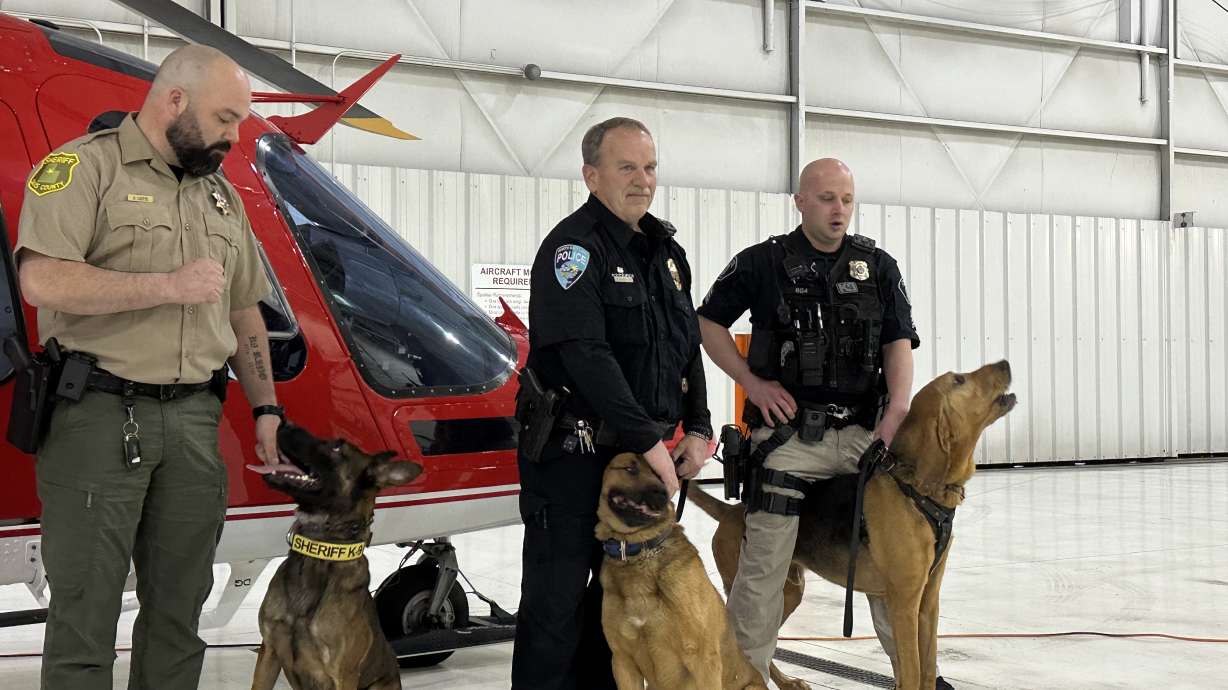SALT LAKE CITY — The regrettable loss of a service dog in the line of duty not only impacts the public service agency they serve in terms of lost resources but also affects morale within the agency.
For those involved, the loss of a service dog during duty feels akin to losing a valued team member, according to statements made.
“The incident left a significant void in our hearts,” expressed West Jordan Police Sgt. Ken Dallholt during a press conference on Tuesday, recounting a tragic event in February 2022 while attempting to apprehend a fugitive. “The pain we experienced was immeasurable, and we are still in the process of healing from it today — we have taken steps to improve ourselves, and this program is one of those steps.”
In a pioneering initiative, Intermountain Life Flight, in collaboration with local veterinarians, specialized animal hospitals, and public safety agencies, is introducing a groundbreaking solution to provide immediate care for service dogs injured in the line of duty — a protocol that was previously nonexistent for K-9 units injured in action.
Intermountain Health unveiled a program on Tuesday that leverages its fleet of Life Flight air vehicles to offer emergency care and transportation for Utah K-9s in need, ensuring prompt assistance for police dogs injured or falling ill while on duty.
“We provide them with the necessary speed to reach the care they require,” stated Tammy Bleak, director of clinical operations for Intermountain Life Flight, during the announcement held at its Salt Lake City hangar. She emphasized that administering first aid trauma care to a dog is operationally similar to providing care to a human, contrary to common belief. Life Flight crews have been trained to deliver aid to K-9s injured during duty and transport them to a veterinary facility for further treatment.
Public safety agencies participating in the program have integrated new medical and first aid training into their K-9 programs to prevent future tragedies like the loss of K-9 Maya. The training and procurement of dogs for K-9 service can incur significant costs, making K-9s a valuable but expensive asset. However, both the agencies and their handlers consider these dogs as invaluable team members.
“He is my companion at home, accompanies me to work every day, shares lunch with me — he is practically by my side everywhere,” shared Box Elder County Sheriff’s deputy Timothy Kennedy regarding his 20-month-old narcotics detection dog named Elvis. “Having access to quality medical care for him, similar to what we have, is immensely important.”
Handlers from various public safety agencies, including police departments from northern Utah, fire departments, and the Federal Emergency Management Agency, gathered with their K-9 partners to commemorate the program’s announcement. These service dogs play diverse roles in assisting their handlers and are esteemed as crucial team members by their respective agencies.
Some K-9 units are trained as patrol dogs to support officers in hazardous situations, while others specialize in detecting narcotics, tracking missing persons, or conducting search and rescue operations in emergencies such as earthquakes or fires.
From a logistical perspective, K-9 units are invaluable assets available to communities during emergencies. With a sense of smell 100,000 times more sensitive than that of humans, K-9s are indispensable for tracking scent trails, making them vital in solving missing persons cases.
“Our objective is to maintain their well-being so they can continue to save human lives,” explained Dr. Laura McLain, the veterinary medical director for Intermountain Life Flight’s K-9 Transport program, during the press conference.
The Intermountain Life Flight K-9 Air Medical Transport Service, the third of its kind in the country, has been operational since February 1 and, fortunately, has not yet been deployed for a K-9 rescue mission. However, in the event of such a scenario, injured K-9s and their handlers can take comfort in knowing that help is readily available.
